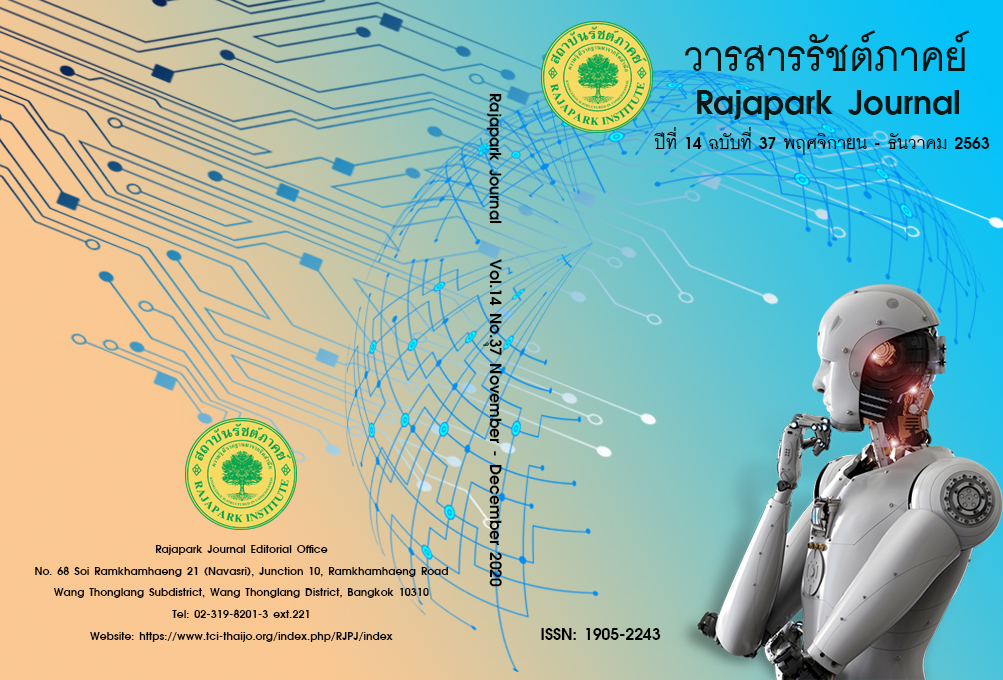การพัฒนาค่านิยมของเจ้าหน้าที่ของรัฐที่เอื้ออำนวยต่อการให้บริการประชาชนของเทศบาลนครสมุทรปราการ
Main Article Content
บทคัดย่อ
การศึกษาครั้งนี้มีวัตถุประสงค์สำคัญเพื่อศึกษาปัญหาเกี่ยวกับค่านิยมของเจ้าหน้าที่ของรัฐที่เอื้ออำนวยต่อการให้บริการประชาชนของเทศบาลนครสมุทรปราการ และศึกษาแนวทางการพัฒนาค่านิยมของเจ้าหน้าที่ของรัฐที่เอื้ออำนวยต่อการให้บริการประชาชนของเทศบาลนครสมุทรปราการ โดยใช้แนวคิดค่านิยมของเจ้าหน้าที่ของรัฐเป็นกรอบแนวคิดการวิจัย ซึ่งประกอบด้วยด้านความซื่อสัตย์สุจริต ด้านระบบคุณธรรม ด้านหลักประชาธิปไตย ด้านการยึดถือหลักการมากกว่าตัวบุคคล และด้านระเบียบวินัย การศึกษาครั้งนี้ใช้รูปแบบการวิจัยเชิงปริมาณ โดยใช้แบบสอบถามเป็นเครื่องมือในการเก็บรวบรวมข้อมูลจากกลุ่มตัวอย่าง รวม 397 คน ซึ่งเป็นประชาชนที่อาศัยอยู่ในพื้นที่ของเทศบาลนครสมุทรปราการ ส่วนสถิติที่ใช้ในการวิเคราะห์ข้อมูล ได้แก่ ค่าร้อยละ ค่าเฉลี่ย และค่าเบี่ยงเบนมาตรฐาน ผลการศึกษาพบว่า ปัญหาเกี่ยวกับค่านิยมของเจ้าหน้าที่ของรัฐที่สำคัญ คือ บุคลากรของเทศบาลนครสมุทรปราการ มีค่านิยมในการให้บริการประชาชนโดยปฏิบัติหน้าที่ราชการอย่างตรงไปตรงมาไม่มากเท่าที่ควร รวมถึงขาดการประเมินผลอย่างเป็นรูปธรรม ส่วนแนวทางการพัฒนาค่านิยมของเจ้าหน้าที่ของรัฐที่สำคัญคือ บุคลากรของเทศบาลนครสมุทรปราการ ควรมีค่านิยมในการให้บริการประชาชนโดยปฏิบัติหน้าที่ราชการอย่างตรงไปตรงมา ด้วยความมุ่งมั่นเอาใจใส่และแสดงออกถึงการสนับสนุนการปกครองแบบประชาธิปไตยเพิ่มมากขึ้น ทั้งนี้ ผู้บริหารเทศบาลนครสมุทรปราการ ควรกำหนดนโยบายและแผนงานที่ชัดเจนในการพัฒนาค่านิยมดังกล่าวแก่บุคลากร มีการประเมินผลอย่างต่อเนื่อง รวมถึงผู้บริหารควรกระทำตัวเป็นแบบอย่างที่ดีในเรื่องดังกล่าวด้วย
Article Details
ทัศนะและความคิดเห็นที่ปรากฏในวารสาร ถือเป็นความรับผิดชอบของผู้เขียนบทความนั้น และไม่ถือเป็นทัศนะและความรับผิดชอบของกองบรรณาธิการ
เอกสารอ้างอิง
Boston, J. et al. (1996). Public Management: The New Zealand Model. Auckland: Oxford University Press.
Cowles, E. L., & Nelson, E. (2015). An Introduction to Survey Research. New York: Business Expert Press, LLC.
Cronbach, L. J. (1990). Essential of Psychological Testing (5th ed.). New York: Harper and Row Publishers Inc.
Denhardt, J. V., & Denhardt, R. B. (2003). The New Public Service: Serving, not Steering. New York: M.E. Sharpe, Inc.
Hiranto, U. (1983). Definition of Sociology and Antopology. Bangkok: Odeon Store.
Kateri, M. (2014). Contingency Table Analysis Methods and Implementation Using R. New York: Springer Science and Business Media.
Office of the Civil Service Commission. (2011). The Royal Guidance of His Majesty the King Bhumibol Adulyadej Bestowed upon the Civil Service’s Day, B.E. 2540-2552 (1997-2009). Bangkok: Office of the Civil Service Commission.
Osborne, D., & Glabler, T. (1992). Reinventing Government: How the Entrepreneurial Spirit is Transforming the Public Sector. Massachusetts: Addison-Wesley Publishing Company.
Pannasil, P., Kenaphoom, S., & Kosolkittiamporn, S. (2015). The Role of Local Executive in the 21st Century. Journal of MCU Peace Studies, 3(2), 146-161.
Royal Institute. (2013). Royal Institute Dictionary B.E. 2554. Bangkok: Royal Institute.
Rungreungkolkich, W. (2004). Public Administration and Civil Servants’ Performance in Concepts, Theories, and Principles of Public Administration Unit 8-15. Nonthaburi: Sukhothai Thammathirat Open University Printing House.
Samut Prakan City Municipality. (2019). Report on Risks Assessment Regarding Conflict of Interests, Fiscal Year 2019. Retrieved July 25, 2019, from http://www.samutprakancity.go.th/2563/36/02.pdf
The Bureau of Registration Administration, Department of Provincial Administration, Ministry of Interior. (2019). Population and Housing Statistics, Nationwide and in Province, as of December 2018. Retrieved March 1, 2019, from http://stat.dopa.go.th/stat/statnew/upstat_age_disp.php
The Determining Plan and Procedures in Decentralizations to the Local Administrative Organization B.E. 2542(1999) The Royal Thai Government Gazette, 116(114).
The Municipal Act B.E. 2496(1953) The Royal Thai Government Gazette, 4(222).
The Municipal Act B.E. 2496(1953) and Amendment No.14 B.E. 2562(2019) The Royal Thai Government Gazette, 136(50).
Turner, R. C., & Carlson, L. (2003). Indexes of Item-Objective Congruence for Multidimensional Items. International Journal of Testing, 3(2), 163-171.
Wesarat, P. (1997). Public Service: Not Hard to Do. Bangkok: The Bureaucratic Reform Committee, Office of the Prime Minister.
Wetcher-Hendricks, D. (2011). Analyzing Quantitative Data: An Introduction for Social Researchers. New Jersey: John Wiley & Sons.
Wiruchnipawan, W. (2004). The Thai Government Official’s Values under the Administrative Reform Era. Bangkok: Four Pace.
Wiruchnipawan, W. (2019). Values of State Officials Enhancing the People Services for the Digital Era Administration of the Bangkok Metropolitan Administration. Al-Nur Journal of Graduate School, Fatoni University, 14(27), 219-237.
Wuthiwiwattanakul, D. (2001). Job Satisfaction and Performance of Operating Staff of Government Savings Bank, Phahonyothin Office. Master’s Degree (Business Administration). Kasetsart University.
Yamane, T. (2012). Mathematics for Economists: An Elementary Survey. Whitefish, Montana: Literary Licensing, LLC.
Interview
Chaikitdennapalai, P. (2019). Former Member of the House of Representatives, Samut Prakan Province. Interview, January 20, 2019.


